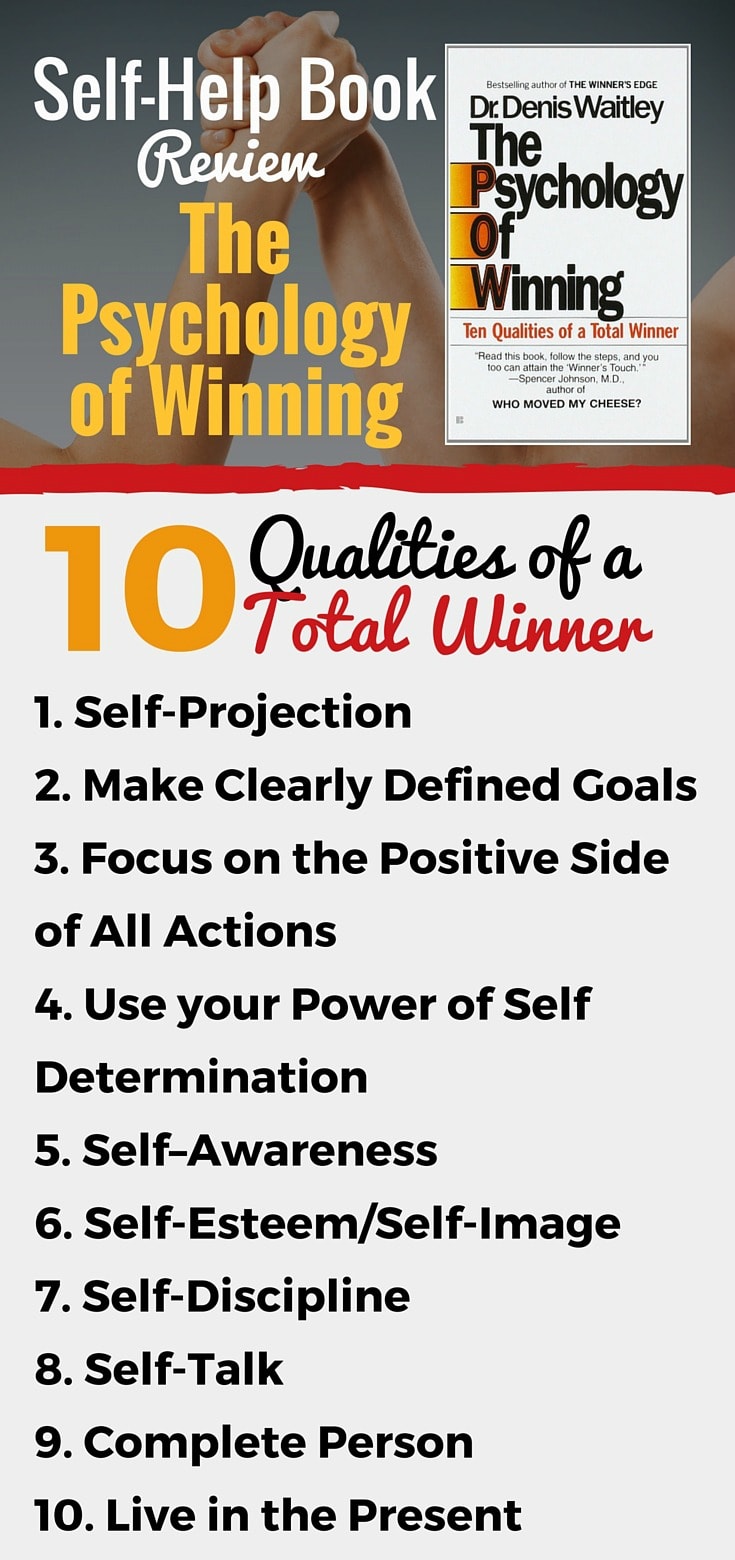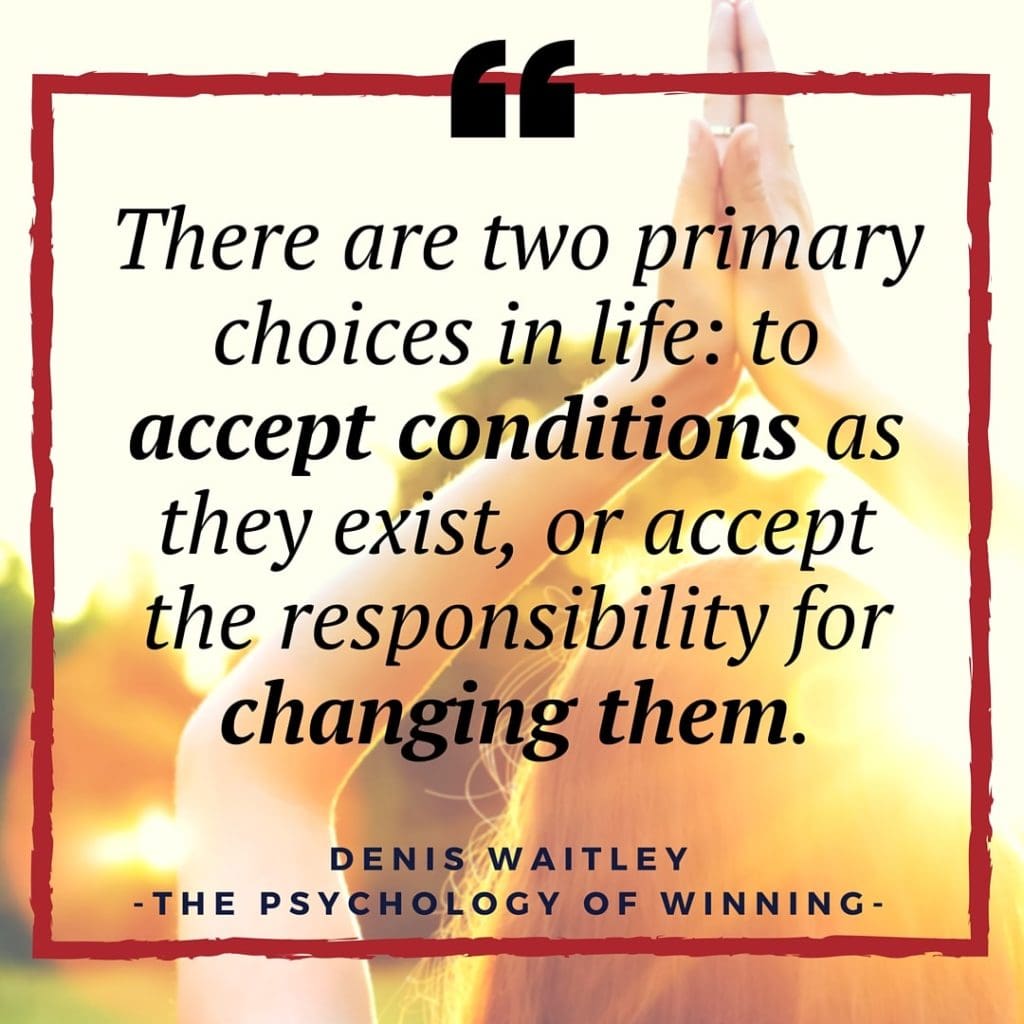Dennis Waitley is a man who understands the concept of “winning” and what it takes to push high performance to the next level.
He has coached Super Bowl and Olympics athletes, medical researchers, top executives and even returning POWs to help them understand how they can achieve to the maximum of their god given potential.
His motivational book, The Psychology of Winning is a classic. It was written in 1984. The same year that saw the first Apple Macintosh; the virgin flight of the Space Shuttle, and the totally awesome Wendy’s Where’s the Beef commercials.
However, don’t let the year The Psychology of Winning was published fool you. The information in this book is just as sharp, cutting edge and effective today as it was over 30 years ago, when the Rubik’s Cube and the Sony Walkman were all the rage.
“Winning” – Isn't that Charlie Sheen's thing?
I will admit. I was actually a bit turned off by the title, The Psychology of Winning when I first saw it. My initial reaction was of Charlie Sheen and his incoherent, “Winning” rants.
Even without the input of good old Charlie and his “Tigers Blood”. The term “winning” used in this way seems a little too smug. The sort of thing two overly privileged guys might say while sharing a fist-bump bromance.
In fact, even in 1984 this phrase seemed a little to smarmy, and the author himself comments on this fact in this quote:
The term ‘Winning’ may sound phony to you. Too materialistic. Too full of A’s, or luck, or odds, or muscle-bound athletes. True winning, however, is no more than one’s own personal pursuit of individual excellence. You don’t have to knock other people down or gain at the expense of others. ‘Winning’ is taking the talent and potential you were born with, and have since developed, and using it fully toward a goal or purpose that makes you happy.
Dennis Waitley, The Psychology of Winning
Winners and Losers are not in Competition
As you can clearly see from the quote above “winners” and “losers” are not about competition. There is not a line separating the 1% as “winners” from the rest of us.
Winning is not about materialism, or simply about sport. It is about finding your success in life, whtever that may be. It may be about finindg happiness. I may be about achieving a peaceful mind. It is about being a success in the life you desire and working to achieve all your goals.
One of the things that made me very happy when reading this book is the emphasis that Waitley puts on habits.
One clear distinction Waitley makes between life’s winners and losers is that winners build good habits that help them succeed while losers retain all their bad habits and are content to live a life with fear and regret.
That is exactly how I feel, and why I have been working on the DevelopGoodHabits website and my habit books for so many years.
Winning, according to Waitley is not about that fist-bumping bromance I discussed earlier. It is not about demolishing your competition. It is simply about developing a positive, growth mindset and building those wining habits.
For most of the book Waitley talks about the ten qualities that make the “Winner” something special.
Let’s take a look at these 10 winner qualities one at a time…

10 Qualities of Winners
1. Self-Projection
Self projection is simply the act of having a very clear and distinct picture of what you want to achieve.
It is about knowing your end goal, but it is more than that. Rather than just having an end goal make a movie in your head that shows you achieving that goal.
For example, if your goal for your hard work is to spend time with your family. Visualize the vacation you are working toward. Having concrete goals like this gives you something to work for that is more exciting than simply completing the annual TPS report.
Self projection can include mantra’s and affirmations to help kep the idea of your future success firmly in mind.
2. Make Clearly Defined Goals
Self projection is great. But by itself, you are just daydreaming. To achieve anything of substance you will want goals that are clearly defined. I prefer SMART Goals and have even written a short book covering this topic.
Learn how to turn your goals into habits: S.M.A.R.T Goals Made Simple
SMART goal setting creates goals that hit all the important metrics.
A SMART goal is:
Want to get started on your SMART goals? The video below provides a quick overview of SMART goals and then show three examples for each of the seven areas of your life.
3. Focus on the Positive Side of All Actions
People who fail are always worried. What if I miss this shot? What if the boss doesn’t like my project? What if I fail to reach my goals?
This worry and fear does nothing good for you, All it does is increase your stress and make it more likely that you miss the shot, mess up your project or fail to reach your goals.
It is far better to stay optimistic and positive about the outcomes. See yourself making that shot as your take it. Know that you are doing the best you can on the project, and the boss will love it. See yourself reaching your goals, plan to avoid obstacles and visualize your success.
4. Use Your Power of Self Determination
You need to feel invested in the things you do. It is not about doing that project at work, because the “boss needs it”. Own the project. Make it your own.
When you put your “stamp” on things and take ownership of them, you are taking things out of the hands of fate and putting them into your own hands. Success or failure is all on you. Not on the will or whim of others.
“Let’s see what happens” is the anti-thesis of this ideal. The self determined person will make it happen. They will have contingency plans and work to ensure that nothing blindsides them and keeps them from their goals. The losers just scrape by with the minimum and “let things happen”.

5. Self-Awareness
No one is perfect. We all have our flaws and foibles. Being a winner is not about being perfect and always succeeding regardless of the odds.
It is about knowing your weaknesses and planning for them. To be a winner you may need to outsource or delegate tasks that are difficult for you. Focusing on your core genius. You may need to delegate a lot of extra time for tasks that others can do quickly. It is all about this understanding of yourself.
Being self-aware is also about empathy. If you understand how those around you feel, and can feel their situations and pain, it gives you a broad base of understanding.
This understanding can even lead to being more adaptable and ready for change. When you increase your adaptability, the odd things that always “pop up” that might cause the goals of others to fail will never derail you from success.
Being adaptable means you will roll with the punches and simply recalibrate your plans to include the new changed situation.
6. Self-Esteem/Self-Image
This is where the smarmy guys doing bromance fist-bumps does come into play. It is important to have a high self-esteem and self confidence to be a winner.
Okay, confidence does not really need to have that kind of ego. I was trying for a bit of call back humor there.
Seriously though, I consider myself to be confident with a decent self esteem, yet I also consider myself to be an introvert. You do not need to be the life of the party, backslapping, extrovert to tick off the self esteem box. You simply have to have faith in yourself.
See how to cultivate a positive self-image: How to Be Yourself and Cultivate a Positive Self-Image
7. Self-Discipline
No one likes to hear that success is going to take a lot of work. Many people want easy answers and “hacks” these days. They want the shortcuts that will get them around the hard messy, “work” part of the equation.
Sorry to say, there are no success hacks. To achieve your goals you will need to build the hard habits. You will need the self-discipline to keep them going… and the self-discipline to start them once again if you happen to fail the first time
8. Self-Talk
One difference between Waitley’s winners and losers is self-talk. The winners will have self talk that helps them strengthen their self-image and self-disciple. The losers are the ones who too listen too frequently to negative self talks.
I think of these as the little “angel” and “devil” sitting on someone’s shoulders like you might see in classic cartoons.
The devil says things like:
The angel says things like:
We all have a little bit of both; the id and the super-ego of or minds. (or the angel and the devil if you prefer).
Sometimes the devil will win. The important part is keeping those wins to a minimum and having the resilience to bounce back and start over when you do fail.
9. Complete Person
Hopefully you see by now that Waitley’s, “winner” is not defined by the guy who drives the biggest car or who has the biggest bank account. The winner is about much more than that.
While work, drive and creating a wonderful future from your hard work and toil is a big part of the equation, it is only part of it. A winner should be part of the community.
They should be spiritual and believe in something greater than themselves, regardless of what shape that belief takes. They should take equal effort to enjoying time with their family as they do diving into projects at work.
Everything matters. Putting everything together may not make you the richest person you know in monetary wealth. Mr. Scrooge was wealthy until he had some bad figgy-pudding and turned his life around.
Material wealth means little compared to the wealth of a loving family and admiring friends, neighbors and co-workers

Another part of being a complete person is working with others.
According to Waitley, winners do business with others, trying to make them into winners too. They strive for mutual success, not domination. They prefer to work with people to attain that mutual success rather than fighting over small details to ensure they absolutely got the best of any situation.
While Waitley’s, “losers” are worried that they are being exploited or spending time and effort trying to exploit others. While Waitley’s “winners” strongly believe in the maxim, a rising tide lifts all boats.
10. Live in the Present
Waitley’s definition of winners shows that they understand the value of time.
They will not worry about the past. That is dead and gone. The only thing the past is good for is to learn from mistakes, and the fond memories of those we love.
They will not worry about the future, once they have set realistic and achievable goals. The good future is what all winners hope to achieve, but too much time spent daydreaming of future success can keep you from taking the action you need to take TODAY to achieve that success.
Winners, therefore, need to take action immediately. They need to learn how to maximize their productivity while still taking time to spend with their friends, family, and loved ones.
They enjoy their time NOW. They savor life and all it has to offer.

Final Thoughts on The Psychology of Winning
The Psychology of Winning has a lot of “self” in it. Self-discipline, self-talk, self-image, self projection, Self-esteem, self-determination, self-awareness.
It puts the onus of the success or failure of your goals on your own shoulders. I like this a lot.
It gives you some tools and ideas on how to get it done. In this book review of The Psychology of Winning, I gave you and idea of the ten main points he uses to back up his “winning” ideal, along with my personal point of view of many of these, mixed in with what he discusses in the book.
However, the book is far more in depth, and gives many wonderful examples from world classes athletes, POW survivors and all sorts of highly successful people.
The book does have a few moments where it seems a little bit dated. The phrase “winning” itself being tainted by the use by Charlie Sheen, as mentioned earlier.
But on the whole this is barely noticeable. 95% of the information could have been written by a leading psychologist at Stanford today, just as easily as the world renowned expert from 1984.
In 2014, Waitley made an audio version updated for the 21st century. The good news is that if you have Audible, or sign up for the 3 month free trial, you can get it for free.
Finally, if you want to level up your productivity and time management skills, then watch this free video about the 9 productivity habits you can build at work.




Hi Scott! It seems that what I’ve been hearing and writing about were already said may years ago! Haha. But it’s always good to look at it on a fresh perspective.
I like #8 Self-talk- reinforces my advocacy.
I like and agree with what you say on #6 – self-esteem is not being extrovert or being life of the party- it’s being able to truly believe in oneself.
Rob,
Haha. I thought exactly the same thing reading and writing the review. It is weird how Dr. Waitley was talking about a lot of the stuff I “discovered” on my own as an adult way back when I could count my age only using fingers. Goes to show that there are almost never truly “new ideas” only reinterpretations of old ideas.
Of course, people need to keep hearing this until everyone “gets it!” So that keeps us working. 🙂
winning matters! It give a huge self confidence boost.On your own its quite hard. It helps to have a little help from another person or a virtual assistant!
Suzy,
You make a great point. For habit development, I recommend racking up Small Wins first. (The easy habits to develop) This is due to that exact fact. Once you have a winning mindset, the ball keeps rolling and all future wins become that much easier.
You are also right about help being… helpful. I would be lost without my VA these days. But made it many years without her at first. It just increases the difficulty when you go it alone.
Thanks for a great comment!
Great piece. It is not easy trying to summarize such great work because you begin to wonder what to include in your summary and what to leave out.
Yes Waitley is a great guy. Am still blown away by his presentation at the 2004 Jim Rohn leadership weekend event.
@ Rob and Scott, it is true that nothing is entirely new. But as Zig Ziglar will say, motivation is like a fire and if you dont keep adding fuel , the fire goes out. At the Jim Rohn 2004 leadership weekend event, Denis waitley himself commented on that point: Because you took your bath this morning does not mean you will not take another bath tomorrow.
Same reason I run a weekly energizer section on my blog to give everyone a jolt of positive energy weekly. See it here:http://www.successsecrets01.blogspot.com